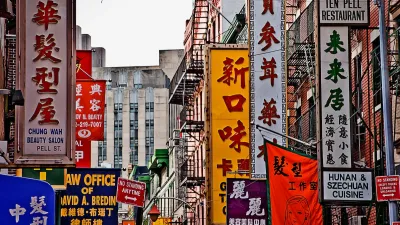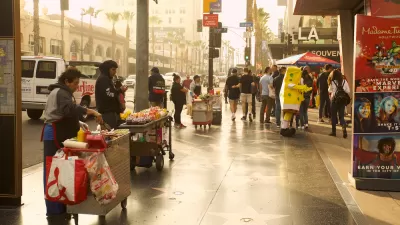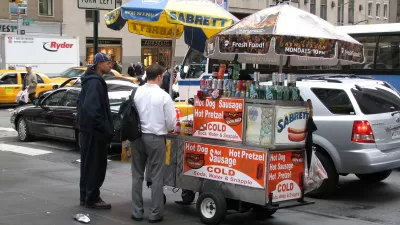New York has become a concentration of the super-wealthy, and soaring real estate values are driving out supermarkets. Will street vendors be able to fill the gap?
"Over the last six years, researchers report, the number of supermarkets in New York has shrunk by a third. Three of the city's top food chains -- D'Agostino, Gristedes, and Key Food -- "have each closed about a dozen stores since 2000."
Why are New York's supermarkets shutting down? No one needs to call in the FBI to investigate. Analysts already know the answer. New York is simply becoming too unequal -- too economically top-heavy -- to sustain the basics of modern American middle class life.
The enormous wealth now concentrated in New York has sent property prices so high that supermarkets can no longer afford to rent their urban spaces. The city's 'soaring real estate values,' the Washington Post notes, 'are prompting property owners throughout the city to shutter grocery stores and sell to developers.'
Those developers are bringing to market condos and businesses that cater to the ever-richer ranks of New York's awesomely affluent. No mystery why. These affluents have congregated in New York at levels seen nowhere else in the United States.
One telling statistic: The average weekly salary in New York County -- Manhattan -- hit $2,821 in 2007's first quarter, the equivalent of $147,000 a year. That figure over tripled, for that time period, the national average weekly take-home.
Amid all this inequality, only those at the tippy top of the income ladder can afford to live stress-free and comfortably in Manhattan. The market has priced out most everyone else. If you can't afford to shell out $1 million, you haven't been able, since 2004, to afford the average Manhattan apartment. On the city's Upper East Side, apartments with three or more bedrooms average $6.6 million.
Meanwhile, New York mayor Michael Bloomberg, the billionaire who made his fortune selling information services to Wall Street, is working hard on solutions to the city's widening supermarket crisis. The Bloomberg administration, according to news reports, is planning 'to license 1,500 street vendors to sell fruits and vegetables.'"
FULL STORY: New Yorkers Get Priced Out of Grocery Stores

Alabama: Trump Terminates Settlements for Black Communities Harmed By Raw Sewage
Trump deemed the landmark civil rights agreement “illegal DEI and environmental justice policy.”

Planetizen Federal Action Tracker
A weekly monitor of how Trump’s orders and actions are impacting planners and planning in America.

The 120 Year Old Tiny Home Villages That Sheltered San Francisco’s Earthquake Refugees
More than a century ago, San Francisco mobilized to house thousands of residents displaced by the 1906 earthquake. Could their strategy offer a model for the present?

Ken Jennings Launches Transit Web Series
The Jeopardy champ wants you to ride public transit.

BLM To Rescind Public Lands Rule
The change will downgrade conservation, once again putting federal land at risk for mining and other extractive uses.

Indy Neighborhood Group Builds Temporary Multi-Use Path
Community members, aided in part by funding from the city, repurposed a vehicle lane to create a protected bike and pedestrian path for the summer season.
Urban Design for Planners 1: Software Tools
This six-course series explores essential urban design concepts using open source software and equips planners with the tools they need to participate fully in the urban design process.
Planning for Universal Design
Learn the tools for implementing Universal Design in planning regulations.
Clanton & Associates, Inc.
Jessamine County Fiscal Court
Institute for Housing and Urban Development Studies (IHS)
City of Grandview
Harvard GSD Executive Education
Toledo-Lucas County Plan Commissions
Salt Lake City
NYU Wagner Graduate School of Public Service





























